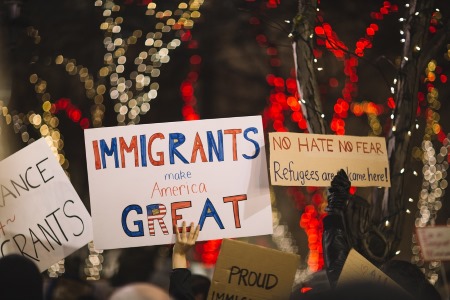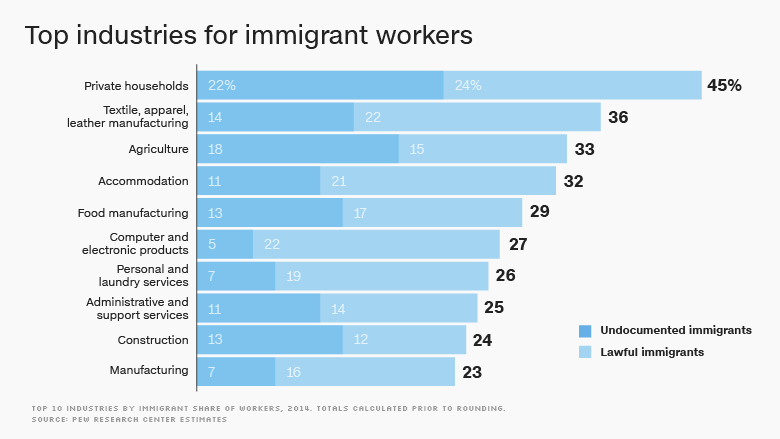In light of the many changes to and increasing restrictions on immigration to the United States being made by the current administration, employers are finding themselves with a set of challenges quite different from previous years. Where once there were many applicants clamoring for the same position, many companies prepared to hire workers are finding themselves unable to find suitable applicants. The talent pool in many industries, which was previously brimming with skilled workers from all over the world, has begun to dry up, leaving companies understaffed and wondering what comes next.
New Challenges for Immigrants
 Despite the “Buy American, Hire American” executive order passed by President Trump, which is based on the idea that there is a job shortage for Americans because of temporary visa holders and immigrants, unemployment in the United States has plunged to a new 50-year low, from over 9% in 2011 to a current 4.1%, and an estimated 3.5% by 2019. In some markets, job creation is expected to slow, not because of a shortage of positions to be filled, but because there simply are no longer enough workers. This fact remains ignored by the Trump administration, which aims to limit both legal and illegal immigration for everyone from CEOs to DACA (Deferred Action for Childhood Arrivals) recipients.
Despite the “Buy American, Hire American” executive order passed by President Trump, which is based on the idea that there is a job shortage for Americans because of temporary visa holders and immigrants, unemployment in the United States has plunged to a new 50-year low, from over 9% in 2011 to a current 4.1%, and an estimated 3.5% by 2019. In some markets, job creation is expected to slow, not because of a shortage of positions to be filled, but because there simply are no longer enough workers. This fact remains ignored by the Trump administration, which aims to limit both legal and illegal immigration for everyone from CEOs to DACA (Deferred Action for Childhood Arrivals) recipients.
Even H-1B visa holders, who are highly-skilled workers in in-demand roles, have come under fire with the introduction of new proposed regulations that would both limit the definition of “highly-skilled,” and prevent their spouses from working in the United States. The administration also plans to shrink the H-1B visa lottery and limit post-graduation opportunities for foreign students who study in the United States. Many H-1B visa holders working in highly technical, specialized fields, including STEM, would be forced to wait even longer for their residency, or not receive it at all, which would encourage them to “self-deport,” seeking greener, friendlier pastures. In terms of the health of the U.S. economy, such regulations would be foolish, as they involve removing long-established, valuable workers and job creators from the picture under the assumption that similarly-skilled Americans would take their place. In many markets and industries, that is simply not the case.
Struggling Companies, Struggling Communities
Labor shortages are just as effective at preventing economic growth as job shortages. Companies in Florida are finding themselves unable to track down construction workers to ease the growing housing demand, Texas is facing the prospect of limiting oil production due to a shortage of truck drivers, and Maine is feeling the winter chill more keenly than ever without snowplow drivers to clear the streets. So, where is this apparent abundance of U.S. workers that are missing out on jobs because supposedly “foreigners” are taking these jobs away from them? It is simply not the case.
Many prominent U.S. industries necessary to keep American communities running smoothly on a day-to-day basis would be crippled without immigrant workers. Over 63% of workers in the beauty industry are immigrants, as well as 60% of graders and sorters of agricultural products, who make sure America’s food is safe, 59% of plasterers and stucco masons, 52% of agricultural workers, 49% of drywall and ceiling tile installers, and 50% of maids and housekeepers are all immigrants, according to Pew Research. Per the 2014 census data, about 12.1% of the U.S. workforce was comprised of immigrants who were in the United States legally. Of these industries, farming will be hit the hardest, as farmers report that they often cannot find Americans willing to do the required labor for the industry average of $12 an hour. The worker shortage has become so critical that the American Farm Bureau Federation has petitioned Congress to begin issuing more agricultural work visas.

Despite the Republican attempts to add jobs via tax cuts for corporations, those vacancies remain open, and companies cannot find workers willing to take the salaries they offer. Many of these jobs, including manufacturing positions, are desirable and well-paid, but require technical skills that many Americans do not possess and are unwilling to learn. Were these positions made available to immigrants, who are often highly educated and skilled, and who are willing to work for wages that companies are willing to pay, these companies could keep up with demand and, in turn, produce growth in the American economy rather than stagnation.
Highly-Skilled Workers: Keeping the U.S. Competitive
Restricting the number of highly-skilled foreign workers is equally troublesome. Research shows that keeping the best and brightest foreigners in in-demand fields out of the United States prompts tech firms to move their operations out of the country, removing even more American jobs. There is a skill gap in the United States, as not enough Americans have the qualifications to enter the rapidly growing and increasingly vital STEM fields. Similarly, skilled doctors, researchers, professors, and other degree-holding, brilliant workers being discouraged from coming to or remaining in the United States means that those who would benefit from their skills and who would work for or with them in jobs they create would no longer have the opportunity to do so. Without access to the best minds in these fields, the United States will continue to fall behind other developed nations in everything from medicine to technology, damaging its status as a major world player. America thrives on innovation, and intentionally limiting that innovation and restricting those who could help improve the U.S.’s most vital industries does the entire nation a disservice.
I-Squared: Bringing the Best to the U.S.
Despite these seemingly grim tidings for existing and would-be immigrant workers and entrepreneurs, many legislators recognize the value they add to both the economy and to the United States’ cultural wealth. In January 2018, Senators Orrin Hatch (R-UT) and Jeff Flake (R-AZ) debuted the Immigration Innovation Act of 2018 (I-Squared), which aims to raise the H-1B visa cap to 85,000 from 65,000, with the possibility of adding even more available visas, up to a maximum of 195,000, when the demand for skilled workers is high, as it is now. In these cases, visas would be granted to advanced U.S. STEM degree holders from all over the world who possess the skills needed to succeed in America’s most demanding jobs. Exceptional professors and researchers, as well as individuals of extraordinary ability would also be exempt from visa caps. The I-Squared bill would also eliminate per-country caps on immigrant visas, create streamlined procedures for certain employers to hire foreign professionals and sponsor them for conditional permanent residence, and remove the requirement for foreign students to maintain a foreign residence.
On a personal level, these individuals will have access to facilities, research, professional peers, and thriving work environments that might not exist in their home countries, which will allow them to reach their fullest potential. Measures like these would ensure that the most skilled, valuable individuals have the opportunity to enrich the United States and help to bolster its most vital industries.
Although the United States is breathing a collective sigh of relief that the harrowing job shortages of the Great Recession are coming to an end, it must face these new challenges in order to move forward. Allowing growth to stagnate simply because those most fit for the jobs were not born in the United States is a self-defeating approach for a nation that strives to be the most successful, innovative place in the world. If the nation continues to foster the mindset suggested by the “Buy American, Hire American” executive order, then it is ignoring the economic reality that the United States thrives when diversity is allowed to flourish.

